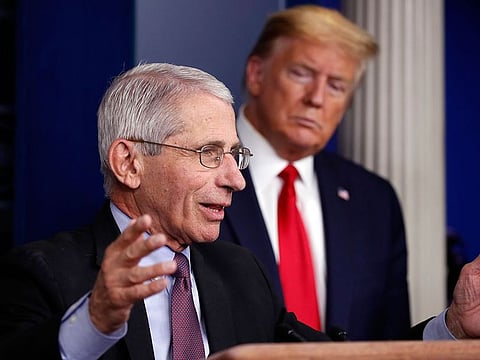Covid-19: Attacking expertise sends a dangerous signal
Coronavirus is the common enemy the US must fight against, not scientific advice

A research-type list of apparently erroneous comments made by top US infectious disease expert Dr Anthony Fauci was widely shared by the Trump administration last week.
It followed a scathing opinion piece for USA Today written by Peter Navarro, President Donald Trump’s top trade adviser, in which he claimed Dr Fauci had been “wrong about everything I have interacted with him on”.
With a style of attack typically reserved for political campaigns, the recent attempts by the US administration to highlight Dr Fauci’s alleged mishandling of the coronavirus outbreak shows a White House at war with its own health experts in the middle of an unprecedented pandemic.
Even though Dr Fauci repeatedly and publicly advocated the use of face masks in public gatherings for everyone in the US, Trump’s aides have posted misleading video interviews suggesting he misjudged the impact of the pandemic early on and failed to warn people about masksGulf News
It comes at a time when coronavirus cases in the US have touched 3.7 million, more than 141,000 people have died of the infection in the country and the virus continues to surge daily in states like Arizona, California, Florida and Texas — a time when the US and the world should definitely welcome more expert opinion, scientific evidence and pragmatic counsel, not less.
Dr Fauci is being targeted by the Trump administration as he continues to contradict Trump on several counts, pushing back on the President’s claims that the outbreak is improving and attributing hasty state re-openings to the recent surges.
US officials, on the other hand, have pointed to Dr Fauci’s changing advice on wearing masks and remarks on Covid-19’s severity as examples of his inconsistent assessments.
Even though Dr Fauci repeatedly and publicly advocated the use of face masks in public gatherings for everyone in the US, Trump’s aides have posted misleading video interviews suggesting he misjudged the impact of the pandemic early on and failed to warn people about masks.
World over, governments and people are relying on the advices of health experts, epidemiologists and specialists who offer credibility, knowledge and integrity, as they navigate uncharted waters.
President Trump — who said earlier this week that he had “a very good relationship with” Dr Fauci and found him to be “a very nice person” — also declared that he doesn’t always agree with him.
It is certainly possible that Dr Fauci might not be 100% right but a coherent and forceful response to containing the virus is only possible when the administration and top scientific advisers continue to enjoy each other’s confidence. Attempting to publicly undermine expert advice at this juncture sends a dangerous signal the world over.
As the world’s largest economy and a global superpower, the international community looks up to the US to lead the way in a united fight against the common enemy — which is the coronavirus, and not scientific advice.









